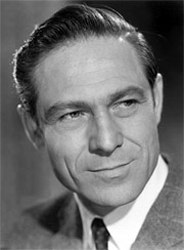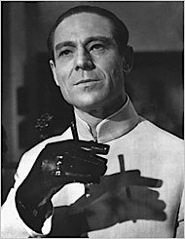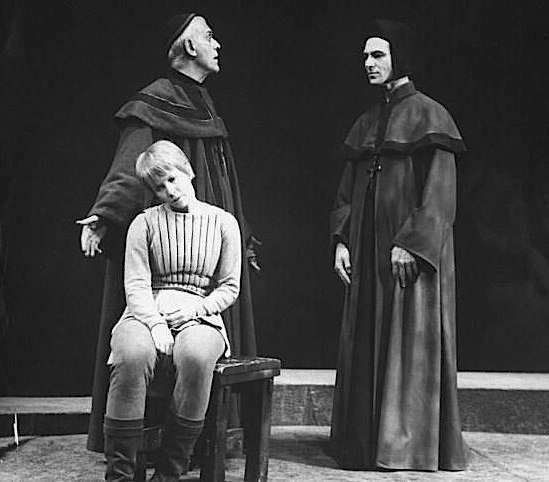Joseph Wiseman
d. October 19, 2009
Joseph Wiseman, the acclaimed actor who preferred to be known for his many stage performances but who gained screen immortality when he created the James Bond supervillain archetype in the title role of “Dr. No,” died Oct. 19 at his Manhattan home after suffering an aneurysm. He was 91.
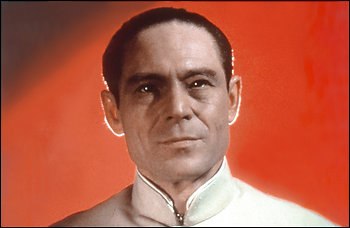
In a nearly seven-decade career, Wiseman worked with the greats of stage and screen. He made his Broadway debut in 1938 in “Abe Lincoln in Illinois” starring Raymond Massey. His last Broadway appearance was in a 2001 revival of Abby Mann’s “Judgment at Nuremberg,” with Maximilian Schell and George Grizzard. The years between included roles in “Candle in the Wind” with Helen Hayes, “Joan of Lorraine” with Ingrid Bergman, a 1947 production of “Antony and Cleopatra” with Katharine Cornell, Maureen Stapleton, Eli Wallach and Charlton Heston, “Detective Story” with Ralph Bellamy and Edward Binns, a revival of “Golden Boy” with Lee J. Cobb, John Garfield, Jack Klugman and Arthur O’Connell, “The Lark” with Julie Harris, Theodore Bikel, Christopher Plummer and Boris Karloff, and the title role in 1969’s “In the Matter of J. Robert Oppenheimer,” for which he won the Drama Desk Award.
Wiseman’s first notable screen appearance was in 1951’s “Detective Story.” He was one of several members of the play’s cast who recreated their roles for the film version starring Kirk Douglas and William Bendix. The following year he had a major role in “Viva Zapata” with Marlon Brando and Anthony Quinn. In 1957, he appeared with Lee J. Cobb, Richard Boone, Harold J. Stone and Robert Loggia in “The Garment Jungle.”
His other films include “The Unforgiven,” “Bye Bye Braverman,” “The Night They Raided Minsky’s,” “The Valachi Papers” and “The Apprenticeship of Duddy Kravitz.”
Wiseman also worked in the early days of live television in New York, in episodes of Lights Out, Tales of Tomorrow, Danger, Suspense, Armstrong Circle Theatre, Kraft Television Theatre, Producers Showcase and others. Later he journeyed to Hollywood to appear in such filmed series as Desilu Playhouse, Adventures in Paradise, The Westerner, The Twilight Zone, Wagon Train, Bob Hope Presents the Chrysler Theatre and Night Gallery.
He went on to play villains in episodes of everything from The Untouchables to T.H.E. Cat, as well as Coronet Blue, The Outsider, The FBI, McCloud, The Streets of San Francisco, The A-Team, The Greatest American Hero, Magnum P.I. and others. He was often cast as a vicious ganglord, as in his recurring role in the 1986 series Crime Story, but also had sympathetic parts in TV dramas such as “QB VII” and “Masada.” In a bit of classic kitsch, he played the space villain Draco, father of evil Princess Ardala, in the 1979 pilot for Buck Rogers in the 25th Century, released later as a theatrical feature.
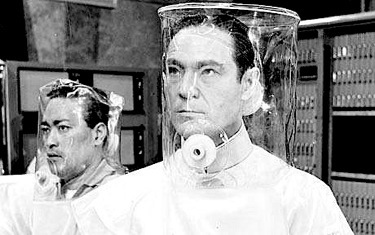
It was “Dr. No,” the 1962 film that brought Ian Fleming’s 007 to the screen for the first time, that gave Wiseman lasting fame. Fleming suggested his friend and Jamaican neighbor Noel Coward for the role, but Coward famously replied, “The answer to Dr. No is no, no, no, no.” Casting Christopher Lee was reportedly discussed, but Bond producer Harry Saltzman remembered Wiseman in “Detective Story” and other films, and decided that he would be perfect for the part of the eerily still yet chilling doctor.
Wiseman’s performance as the half-Chinese SPECTRE mastermind set the standard for coolly superior, preternaturally confident villains in subsequent Bond films, not to mention countless Bond knockoffs. Like many others involved in launching the apparently endless Bond series, Wiseman said he saw nothing special about the film. He told The Los Angeles Times in 1992, “I had no idea what I was letting myself in for. I had no idea it would achieve the success it did. I know nothing about mysteries. I don’t take to them. As far as I was concerned, I thought it might be just another grade-B Charlie Chan mystery.”


